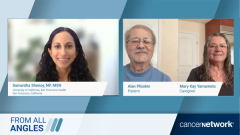
Connecting With Multiple Myeloma Support Groups and Online Resources
Panelists discuss how caregivers can navigate the initial shock of a myeloma diagnosis by seeking reliable information from trusted medical websites, connecting with local support groups, and accessing resources from organizations such as the International Myeloma Foundation (IMF), Multiple Myeloma Research Foundation (MMRF), and patient advocacy groups.
Episodes in this series

Mary Kay Yamamoto, Alan Plisskin’s wife and caregiver, initially had never heard of multiple myeloma and needed to conduct extensive research to understand her husband's diagnosis. Her primary concern was whether Plisskin would survive long enough to receive treatment, reflecting the shock and fear that accompany a multiple myeloma diagnosis. She sought reliable information from trusted medical sources, including the Mayo Clinic and University of California, San Francisco websites, avoiding potentially misleading online content.
The couple discovered valuable myeloma-specific resources through local support groups in the Bay Area, which connected them to national organizations including IMF, MMRF, Blood Cancer United, and Blood & Marrow Transplant of Georgia. These organizations provided access to webinars, educational materials, and Patient Power resources that allowed the couple to engage as deeply as they wanted in understanding the condition.
Support groups serve as crucial information hubs for patients with newly diagnosed multiple myeloma and their caregivers, offering both emotional support and practical resources. The recommendation to join local support groups highlights their role in connecting patients to broader networks of myeloma-specific information and advocacy organizations. These resources enable patients and caregivers to become educated advocates for their care, participating in webinars and accessing current information about treatment options and clinical trials.
Newsletter
Stay up to date on recent advances in the multidisciplinary approach to cancer.






































